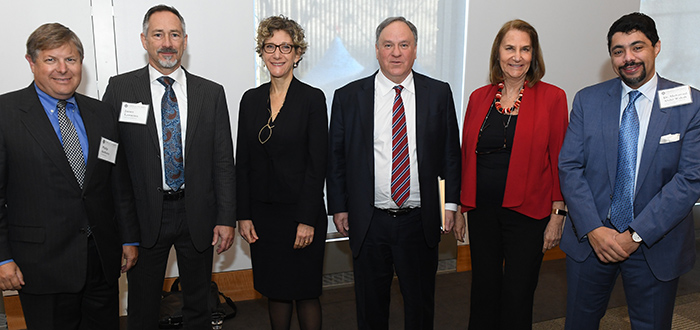
On November 17, Fordham’s International Arbitration Conference brought together experts from around the world to discuss and debate the various facets of international arbitration. The conference, “Facing the Future in International Arbitration: Evolving Issues, Practices and Solutions,” featured panels on gender issues, mock trials, arbitrator duties, third-party funding, the role of the expert in determining value, and arbitration remedies.
The conference was co-presented by the Conflict Resolution and ADR Program and Louis Stein Center for Lawand Ethics at Fordham Law. It was co-chaired by Louis B. Kimmelman, partner and co-leader of global international arbitration practice at Sidley Austin LLP, and Edna Sussman, independent arbitrator and mediator and distinguished practitioner in residence at Fordham Law.

The conference kicked off with a breakfast seminar, “The Impact of Gender in International Arbitration Advocacy—Does it Make a Difference?” organized by ArbitralWomen, a group dedicated to supporting and promoting women in international dispute resolution. Panelists included four current board members of ArbitralWomen: Lorraine M. Brennan, arbitrator and mediator, adjunct professor at Georgetown Law Center, and former president of ArbitralWomen; Dana C. MacGrath, international arbitration practitioner at Sidley Austin LLP and an adjunct professor at Brooklyn Law School; Mirèze Philippe, special counsel at the ICC International Court of Arbitration and co-founder of ArbitralWomen; and Rashda Rana SC, barrister and international arbitrator at St James Hall International and president of ArbitralWomen. The panelists discussed the challenges that women face in the field of international arbitration, examples of gender discrimination, and suggestions as to how women can handle these challenges and maximize their ability to obtain on-your-feet advocacy opportunities and make the most of them by thorough case preparation and speaking with confidence. The panelists emphasized that women should highlight their professional accomplishments and demonstrate that they have the skill set and experience to lead the case.

After welcoming remarks from conference organizers, the audience learned about arbitrator obligations in a panel entitled “Emerging Expectations for Arbitrators? Duties, Accountability and Transparency.” Moderated by American University’s Susan Franck, the panel featured Teresa Giovannini, founding partner of LALIVE; Stephanie Cohen, an independent arbitrator; Michael McIlwarth, global lead litigation counsel for GE Oil & Gas; and Ina C. Popova, partner at Debevoise & Plimpton. Panelists stressed the importance of impartiality and transparency. McIlwarth, for instance, promoted Arbitrator Intelligence, a project that gathers and publishes arbitration awards and court data. Franck suggested the regularization of standards.
The late-morning panel “A Mock Arbitration for Your Case: Optimizing Your Strategies and Maximizing Success” was moderated by Edna Sussman and featured Doak Bishop, partner at King & Spalding; James Lawrence, executive director at the University of Houston Law Center’s Blakely Advocacy Institute; Philip Anthony, chief executive officer of DecisionQuest; Claudia Salomon, partner at Latham & Watkins; and Dr. Mohamed Abdel Wahab, law professor at Cairo University and arbitrator at Zulficar & Partners Law Firm. Bishop suggested that a person considering participating in a mock arbitration case should always ask, what do I expect to get out of this? Panelists agreed on the importance of ensuring confidentiality, eliminating unconscious bias, using neutral test facilities, and hiring outside consultants.

After breaking for lunch and hearing the Hon. Charles N. Brower’s keynote address, the audience met for the panel “Third-Party Funding: What Are the Issues for International Arbitration?” Moderated by Louis B. Kimmelman, the panel featured Christopher P. Bogart, chief executive officer at Burford Capital; Andrea Carlevaris, partner at BonelliEredi; Nikolaus Pitkowitz, partner at Graf & Pitkowitz; Catherine A. Rogers, law professor at Penn State and Queen Mary; and Maya Steinitz, law professor at the University of Iowa. “This is an issue that is clearly commanding a lot of attention, generating a lot of interest, and raising a lot of questions,” said Kimmelman. The panelists focused on how the varied forms of funding in the market may impact arbitrator disclosure and conflicts of interest, applications for security for costs, and exit clauses from financing arrangements.

The next panel was “Determining Value in Arbitration: The Special Role of the Expert.” Moderated by the Georgetown Law Center’s Anne Marie Whitesell, the panel featured Marinn Carlson, partner at Sidley Austin; Boaz Moselle, head of Cornerstone Research’s European international arbitration practice; William W. Park, law professor at Boston University; Jonathan D. Putnam, founder and principal of Competition Dynamics; and Eduardo Zuleta, founder of Zuleta Abogados and vice president of ICC International Court of Arbitration. Panelists addressed the challenges that arbitrators and counsel face when the principal issue in a case—value—is addressed by experts for each party. Panelists stressed that the line between what is a legal issue and what is a matter of expert opinion is often blurred in these cases.

The day’s final panel was “Arbitrator Remedies: What Should the Tribunal Order and Why?” The panel, moderated by Hon. Claire R. Kelly of the U.S. Court of International Trade, featured Franco Ferrari and Clayton P. Gillette, law professors at New York University; M. Alexis Maniatis, president and CEO of The Brattle Group; Pablo T. Spiller, distinguished professor of business and technology at the University of California Berkeley and Compass Lexecon; and John M. Townsend, partner and co-chair of Hughes Hubbard & Reed’s arbitration practice. The panel of professors, economists, and legal professionals discussed the remedies that arbitrators may be able to grant and that judges may not be able to use. Several panelists addressed the need for arbitrators to be sensitive to several jurisdictions, including the jurisdiction in which an award will be rendered as well as in which it may be enforced in determining the appropriate remedy. Economists Spiller and Maniatis elaborated on different theories as to the appropriate rate of pre-award interest to be granted by an arbitrator.

